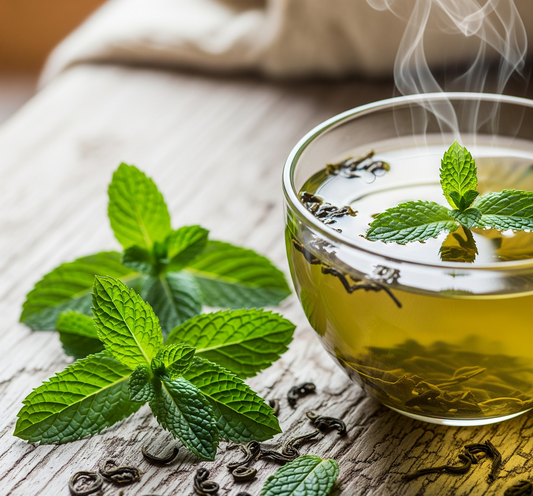Oolong tea, a semi-fermented beverage, bridges the gap between green and black teas, offering a unique flavor profile and numerous health benefits. Rich in antioxidants, it supports heart health, aids weight loss, enhances brain function, and may help manage diabetes. Additionally, oolong tea promotes healthy skin, strengthens bones and teeth, and reduces stress. Incorporating this versatile tea into your routine can enrich your daily wellness and enjoyment of tea.
Oolong tea, often described as the middle child between green and black teas is a traditional beverage that has captivated the hearts and tastebuds of tea lovers for centuries. With its unique flavor and several health benefits. Oolong tea has managed to stand out in the realm of teas. In this article, we will explore some of the top oolong tea benefits and explain why it deserves a place in your daily routine.
Let’s start with the basics, shall we!
What is Oolong Tea?

Oolong tea is made from the leaves of the Camellia sinensis plant, the same plant used for green, black, and white teas. The key difference lies in the oxidation process. Oolong tea is partially oxidized, which gives it a flavor and color profile that falls between green and black tea. The oxidation levels can vary significantly, ranging from 8% to 80%, allowing for a diverse array of flavors—from floral and fruity to rich and roasted.
According to research from ScienceDirect, oolong tea is referred to as semi-fermented tea that contains a mixture of non-oxidized monomeric polyphenols and higher-molecular-weight theaflavins.
With the science behind oolong out of he way, let’s look into some of the top benefits of oolong tea:
1. Rich in Antioxidants
One of the most significant benefits of oolong tea is its high antioxidant content. Oolong tea contains polyphenols, such as theaflavins and EGCG, which help combat oxidative stress in the body. These antioxidants protect your cells from damage caused by free radicals, potentially lowering the risk of chronic diseases.
According to WebMD, high antioxidant levels may contribute to lower blood sugar levels and enhanced cognitive functions.
2. Supports Heart Health
Regular consumption of oolong tea may also contribute to improving heart health. Studies suggest that the antioxidants in oolong tea can help lower blood pressure and cholesterol levels. For instance, a study by MedicalNewsToday noted that people who drank at least 10 ounces of oolong tea weekly had lower risks of having high total cholesterol, triglyceride, and LDL or “bad” cholesterol levels. The polyphenols in oolong tea help relax blood vessels and improve circulation, promoting overall cardiovascular health.
3. Aids in Weight Loss
Oolong tea has gained popularity as a potential aid for weight loss. The combination of caffeine and polyphenols in oolong tea may enhance fat oxidation and increase metabolism. Research indicates that drinking oolong tea can help burn calories, making it a beneficial addition to a weight loss regimen. While it’s not a magic solution, incorporating oolong tea into a balanced diet can support your weight loss efforts.
4. Enhances Brain Function
The benefits of oolong tea extend to cognitive health as well. The caffeine and L-theanine content in oolong tea may improve alertness and focus. Studies such as this one in The Journal of Prevention of Alzheimer’s Disease, have shown that regular tea consumption is associated with a lower risk of cognitive decline and improved memory. So there is some proof that drinking oolong tea may enhance your brain function, making it an excellent choice for those looking to boost their mental performance.
5. May Help Manage Diabetes
Oolong tea may play a role in managing blood sugar levels. Some studies suggest that the polyphenols in oolong tea can improve insulin sensitivity and reduce blood sugar levels. A randomized crossover study such as this one from the American Diabetes Association found that drinking 1500 ml of oolong tea per day for 30 days significantly lowered plasma glucose levels from 229 ± 53.9 to 162.2 ± 29.7 mg/dl (p<0.001) and fructosamine levels from 409.9 ± 96.1 to 323.3 ± 56.4 μmol/l (p<0.01) in type 2 diabetic patients, compared to no changes with water. This finding suggests that oolong tea may be an effective adjunct treatment for type 2 diabetes. However, more studies still need to be done to come up with a definitive conclusion.
6. Promotes Healthy Skin
The antioxidants in oolong tea may also benefit your skin. Research from the National Library of Medicine indicates that drinking oolong tea can help relieve symptoms of skin conditions like eczema. In a study, participants who consumed oolong tea experienced significant improvements in their eczema symptoms. The anti-inflammatory properties of oolong tea can soothe irritated skin and promote a healthier complexion.
7. Strengthens Bones and Teeth
Oolong tea may contribute to stronger bones and teeth. Consuming tea regularly is linked to increased bone mineral density, which can reduce the risk of fractures. Additionally, the fluoride content in oolong tea may help strengthen tooth enamel and reduce the risk of cavities. Incorporating oolong tea into your diet can support your dental and skeletal health.
8. Reduces Stress and Anxiety
The calming effects of oolong tea can also help reduce stress and anxiety levels. The presence of L-theanine in oolong tea has been shown to promote relaxation without causing drowsiness. Drinking oolong tea can provide a soothing experience, making it an excellent choice for those looking to unwind after a long day.
Benefits of Oolong Tea Before Bed
Oolong tea contains varying amounts of caffeine, generally ranging from 10 to 60 mg per 8-ounce cup (approximately 240 ml). This translates to about 15 to 25 mg per 100 ml of brewed tea, depending on the specific type and brewing conditions.

This means that drinking oolong tea before bed can offer relaxation benefits without the jitters associated with stronger caffeinated beverages like black tea and coffee. The moderate caffeine content in oolong tea can promote a sense of calm, making it a suitable choice for evening enjoyment. Just be mindful of your caffeine sensitivity and consider opting for a lightly oxidized oolong if you’re sensitive to caffeine.
For a more detailed breakdown of caffeine content in Oolong teas, you can read our blog on Debunking the Myth: Does Oolong Tea Have Caffeine?
Oolong Tea vs. Green Tea
Both oolong tea and green tea are delightful options for tea lovers. When comparing the two, each tea brings something unique to the table. Oolong tea is partially oxidized, which results in a richer and more complex flavor profile that ranges from floral to fruity. On the other hand, green tea is minimally oxidized which preserves its fresh and grassy notes.
As mentioned above, oolong tea generally has a higher caffeine content compared to green tea, making it a better option for people looking for an energizing option. Similarly, green tea packed with antioxidants makes it a favorite among health enthusiasts.
So whether you prefer the bold, layered taste of oolong or the refreshing grassiness of green tea, both offer a delightful experience.
Pick from our range of premium oolong tea from Nepal Tea Collective.
Side Effects of Oolong Tea
Now that we’ve covered most of the top benefits of oolong tea, we have to cover some of the side effects as well! While oolong tea is generally safe for most people, there’s no hiding from the fact that it does contain caffeine, which can lead to side effects if consumed in excess.
High caffeine intake has been shown to cause anxiety, headaches, and insomnia in some people. So we advise limiting your intake to 6-10 cups per day, depending on your caffeine sensitivity.
Furthermore, oolong tea may also prevent calcium and iron absorption in the body. This can cause problems for people suffering from issues like osteoporosis as it may decrease bone mineral density. It is advised to consult a health care professional if you have a bone disease that may be affected by drinking oolong or any other type of tea.
Conclusion
The benefits of oolong tea are numerous and varied, making it a worthwhile addition to your daily routine. From its rich antioxidant content to its potential to support heart health, aid in weight loss, and enhance brain function, oolong tea offers a unique combination of flavors and health benefits. Whether you enjoy it for its taste or its health-promoting properties, oolong tea is a delightful beverage that can enrich your life.




